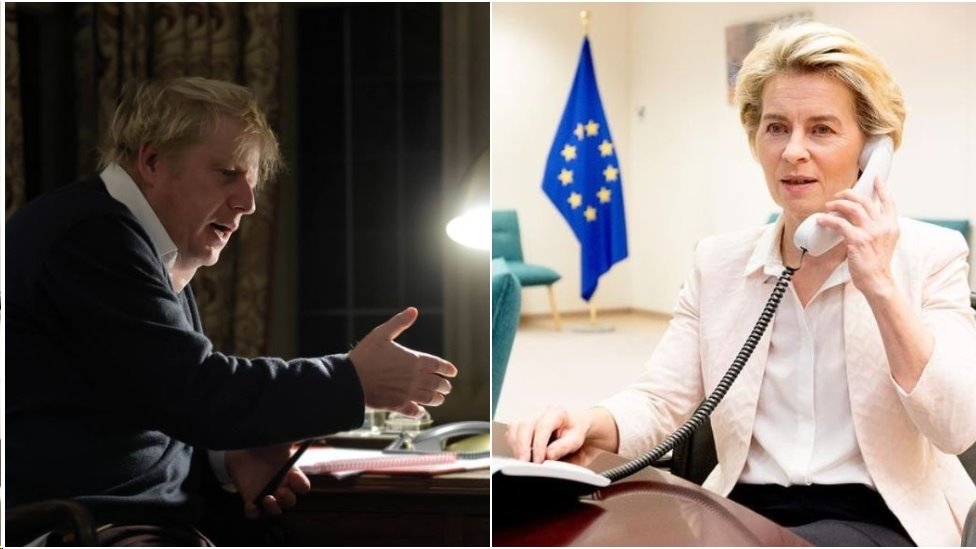
UK Prime Minister Boris Johnson and European Commission president Ursula von der Leyen made the decision during a phone call on Saturday.
A statement said there were three "critical issues" to address.
Negotiating teams will reconvene in Brussels on Sunday, and the leaders will speak again on Monday evening.
But the leaders continued: "Whilst recognising the seriousness of these differences, we agreed that a further effort should be undertaken by our negotiating teams to assess whether they can be resolved."
The BBC's political editor, Laura Kuenssberg, said the next meeting "feels like a last roll of the dice, rather than ironing out a few last minute glitches", and the next 48 hours would be "critical".
The UK left the EU on 31 January but remains under EU trading rules until the end of the year.
The two sides have been holding talks since March in an attempt to secure a deal before this time, which is called the transition period, ends on 31 December.
If a deal is not agreed by that point, tariffs - or taxes on goods - could come into force.
But the same three sticking points have stopped negotiating teams coming to an agreement, and on Friday, talks came to an end with both sides saying "significant divergences" remained.
In their statement, Mr Johnson and Ms Von der Leyen said they "welcomed the fact that progress has been achieved in many areas".
But, they added: "Nevertheless, significant differences remain on three critical issues: level playing field, governance and fisheries. Both sides underlined that no agreement is feasible if these issues are not resolved.
"Whilst recognising the seriousness of these differences, we agreed that a further effort should be undertaken by our negotiating teams to assess whether they can be resolved."

Brexit - The basics
- Brexit happened but rules didn't change at once: The UK left the European Union on 31 January but leaders needed time to negotiate a deal for life afterwards - they got 11 months.
- Talks are on again: The UK and the EU have until 31 December to agree a trade deal as well as other things, such as fishing rights.
- If there is no deal: Border checks and taxes will be introduced for goods travelling between the UK and the EU. But deal or no deal, we will still see changes.

The EU's chief negotiator, Michel Barnier, tweeted after the statement was published, saying: "We will see if there is a way forward."
Ireland's Taoiseach (Prime Minister) Micheal Martin also took to Twitter, welcoming the news that the teams would resume trade talks.
He said: "An agreement is in everyone's best interests. Every effort should be made to reach a deal."
Labour's shadow Cabinet Office minister Rachel Reeves said: "The British people were promised a deal and, with time running out, we urge both sides to get on with reaching an agreement."


It's not over, not yet.
The two sides in this complicated and drawn out process have agreed that it is worth trying one last time to find a way through their profound differences.
But the statements from the prime minister and the EU chief, Ursula von der Leyen, signal clearly that a trade deal is out of reach right now - spelling out that if no-one budges in the next few days, it's simply not going to happen.
A feature of Brexit negotiations has often been the last minute stand off, the political emergency, before suddenly, lo and behold, a deal emerges from the wreckage.
By Monday night, that tradition may have been proven again.
Yet it seems there is a lot more to be done than ironing out a few last minute glitches.

If an agreement is reached it will need to be turned into legal text and translated into all EU languages, then ratified by the European Parliament.
The UK government is likely to introduce legislation implementing parts of any deal reached, which MPs will be able to vote on.
And the 27 EU national parliaments could also need to ratify an agreement - depending on the actual contents of the deal.
But before that, there are even more hurdles to overcome.
The week to come
After the talks between the teams on Sunday and the further leaders' call on Monday, the UK Internal Market Bill will return to the Commons.
Certain clauses allow the government to override elements of the original treaty with the EU for Brexit - the withdrawal agreement - which, if implemented, would break international law.
The EU are unhappy with it, as are the House of Lords, who voted to scrap those clauses of the bill.
But the government is still backing its measures, which could cause tensions in the trade talks, and they are expected to push them through on Monday night.
Another bill with similar provisions - the Taxation (Post-Transition Period) Bill - will also return to the Commons this week.
In addition, EU leaders will be meeting in Brussels on Thursday.
https://ift.tt/3gfozFW
World
Bagikan Berita Ini














0 Response to "Brexit: UK-EU trade talks to resume over 'critical issues' - BBC News"
Post a Comment